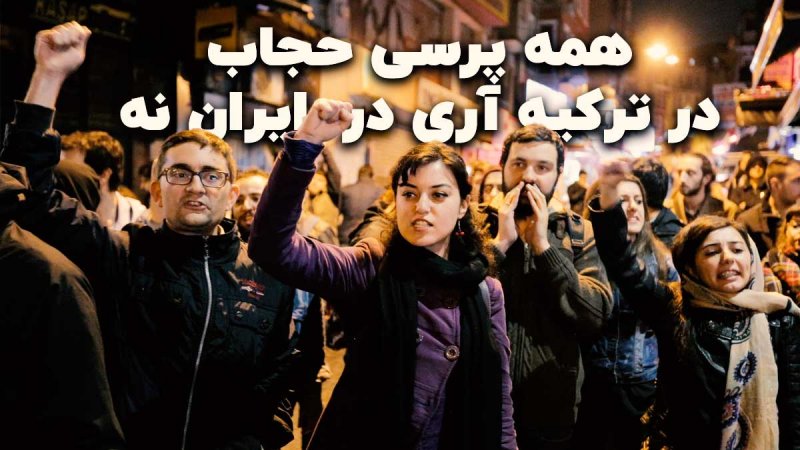Referendum on Hijab: Yes in Turkey, No in Iran
Turkey has found a solution for the hijab issue, but Iran has not. Why can the hijab issue be put to a referendum in Turkey, but not in Iran? In Turkey, due to its secular constitution, wearing a headscarf in public institutions like government offices, schools, and universities has long been banned. However, in 2013, Erdogan’s government lifted many of these restrictions, and now there is news of holding a referendum for the right to wear a hijab in these forbidden places.
In Iran, the situation is completely opposite to Turkey. Hijab became mandatory on August 9, 1983, with the approval of the Islamic Penal Code in the parliament, and penalties were set for not adhering to it in public places. Even before that, in 1980, the entry of unveiled women into offices was banned, which was approved by the Revolutionary Council and announced by Akbar Hashemi Rafsanjani.
Unlike Turkey, where hijab is optional in public places, in these forty-plus years, hijab has been mandatory not only in government places but also in public places in Iran. However, the demand for optional hijab has never been as significant as in the recent years and months, leading to widespread protests after the death of Mahsa Amini. Although in Iran, the idea or proposal of a referendum for optional hijab has been raised several times, the power structure strongly resists it.
Dialogue in Turkey: Yes, in Iran: No
In Iran, after the protests, some proposed dialogue with critics and protesters, but in practice, no real sign of wanting dialogue has been seen. However, in Turkey, there is still enough democracy and real dialogue that the president not only considers the main opposition leader but also proposes a hijab referendum to him.
Erdogan made this proposal in response to the statements of Kemal Kılıçdaroğlu, the leader of the main opposition party, who believed that to solve what he called the deep polarization of society, a law should be passed to guarantee the right to wear a hijab. Erdogan addressed Kemal Kılıçdaroğlu, saying, ‘If you have the courage, let’s put this to a referendum. Let the nation decide on this.’
However, Kılıçdaroğlu did not accept the proposal for a referendum and told the Turkish president, ‘Where did you get the idea of a referendum? Do you intend to imitate Viktor Orban?’ The hijab issue has heated up on the eve of elections, even though no movement or political entity has ever spoken about banning the hijab.
In Turkey, the ruling Justice and Development Party has previously tried several times to at least lift the ban on wearing a hijab in universities, but the country’s Constitutional Court nullified these efforts in July 2008, declaring the action anti-secular.
An Excuse for a Referendum
In Iran, proponents of mandatory hijab argue that Iranian women have chosen hijab without any compulsion and would wear it even if it weren’t mandatory. Ali Motahari, when he was a member of parliament, said if the hijab issue were put to a referendum, hijab would win. Don’t think everyone would vote for non-hijab; even those with loose hijab would vote for it.
However, these kinds of arguments have become very threadbare these days. Proponents of optional hijab say that the claim that a hijab referendum would favor hijab is a good excuse to make hijab optional if you believe it, or if you aren’t afraid of the result, then hold a referendum. After Mahsa Amini’s death and the successive protests, the number of women and girls who do not believe in hijab and deliberately walk in public without headscarves and shawls has significantly increased.
Mohsen Mirdamadi, a reformist political activist, said in 2017 that one of the topics that has been challenged from the beginning and has become increasingly challenged over time is the mandatory hijab. He said part of the people believe in hijab and agree with its compulsion.
Another part believes in hijab but opposes its compulsion. Some do not consider it obligatory, and others do not have much religious attachment or belief, and consequently, they do not have attachment or belief in hijab either. He ultimately concluded that given the diversity of opinions and the increasing challenge, now that the Guardian Council has announced its agreement with a referendum, mandatory hijab can be put to a referendum.
Most Iranians Oppose Mandatory Hijab
So far, no free and credible survey has been conducted inside Iran to gauge Iranians’ beliefs about hijab, or if it has, its results have not been published. The surveys that have been published generally reflect the opinion of the power structure, which usually stated that over 70% believed in hijab. Even if these statistics are correct, these surveys have deliberately or inadvertently overlooked the mandatory and optional aspect of hijab.
However, alongside this, one can refer to the results of parallel surveys that clarify the reality for us. For example, according to the results of the book ‘Surveying the Clothing and Makeup of Iranians’ published in 2013, more than 60% of Iranians were considered to have loose hijab, and it was announced that this statistic was increasing, with loose hijab rising from 60% to over 70% from 2009 to 2012.
According to results published by the GAMAAN Institute outside the country, the Iranian Public Opinion Studies Group in 2020, 57% of the Iranian society does not believe in hijab, and 72% oppose mandatory hijab. In contrast, 15% support mandatory hijab, and 26% believe in its compulsion.
A look at these statistics and results is a good indication of why the power structure is unwilling to hold a referendum not only on the issue of mandatory and optional hijab but also on all other contentious issues in society.

